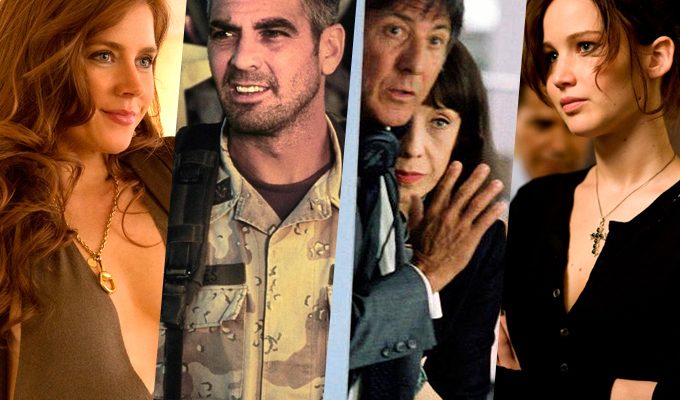
2. “American Hustle” (2013)
There was something sort of fascinating about the marketing of “American Hustle.” The film’s trailers and posters made literally no effort to convey some kind of high-concept, or plot of any kind, just letting old-fashioned star power, a loosey-goosey 70s vibe, and what’s rapidly become a sort of David O. Russell brand. The kind of movie, in other words, that wasn’t meant to get made anymore. It got ten Oscar nominations and took a quarter-of-a-billion-dollars in box office. Russell’s most recent released movie pre-“Joy” might be his toughest to synopsize: in short, it’s the very loosely based-in-fact tale of a con-man (Christian Bale), his partner in crime and in the bedroom (Amy Adams), the FBI agent who enlists them in a sting (Bradley Cooper), the politician they target (Jeremy Renner), the con-man’s wife (Jennifer Lawrence), her mobster lover (Jack Huston), his boss (Robert De Niro) and plenty more beside. This isn’t to say that Russell and his script (co-written with Eric Warren Singer) is uninterested in the story here. It’s more that, even more so than in the unofficial trilogy it completes (though from the looks of “Joy,” it may turn out to be the third part in a four film cycle), he’s leading with character, a movie more about how these people interact, the lies and truths they tell each other, the heartbreaks and deceit they weave, than anything else. In fact, it’s a shame that it couldn’t stick with the original title of the script, “American Bullshit,” a far more accurate reflection of the finished film, and the themes at play. It’s Russell’s most sprawling and novelistic picture, but also his most playful, a freewheeling, raucous party, and one where all the guests are bringing something, from Bale’s pot-bellied, combover-wearing nominal hero, the most relaxed and lived-in thing he’s ever done, to a typical firecracker turn from Lawrence, to Adams’ sultry, vulnerable heroine, to Cooper’s frat-boy, red-mist, jehri-curled FBI agent, to Renner’s slick, disarmingly dignified mayor (the latter was the only one not to get an Oscar nomination: a shame, as he’s as good as the rest). Some dismissed the film as a Scorsese imitator, but a couple of years after the dust settled, it’s clearer than ever that this is the purest David O. Russell picture we’ve had to date.

1. “Three Kings” (1999)
David O. Russell’s big studio debut might have disappointed at the box office, tanked with awards voters and permanently ruptured his relationship with George Clooney (the two famously came to blows on set, Clooney reportedly headbutting Russell over the treatment of an extra), but “Three Kings” now stands as the director’s most perfect picture, one of the very best films of one of the best years in American cinema history. Working from, and heavily rewriting, a script by future “12 Years A Slave” writer John Ridley, “Three Kings” promised on paper to be a sort of gung-ho action movie, a riff on “Kelly’s Heroes” set during the then-distant Gulf War. It does work as an action movie — the action sequences, particularly the big final shoot out, do what they do as well as you could possibly hope. But it also does so much more besides. Clooney, Mark Wahlberg, Ice Cube and, in a surprising, surprisingly effective piece of casting, fellow director and pal Spike Jonze, play four soldiers who go A.W.O.L. in search of Saddam Hussein’s gold (via a map found in a man’s ass) as the Gulf War comes to an end, only to end up in a humanitarian showdown with the Republican Guard. Russell uses the action movie treasure hunt framework for one of the most sharply funny anti-war movies since “M*A*S*H,” and one not happy to simply rest on platitudes, but instead that skewers American foreign policy, embodied through our brash anti-heroes, while retaining a humanism and compassion for everyone involved. Few of the actors have done better work than they do here before or since, and there’s some lovely work in the supporting cast too from Nora Dunn, Cliff Curtis and in particular Saïd Taghmaoui as Wahlberg’s Iraqi interrogator, a man he shares more than a little in common with. Fuck, even Jamie Kennedy’s good here. And, though the film’s startling different stylistically to anything that Russell’s made since, this feels like his coming-of-age as a filmmaker. The characteristic looseness carries over and steers this away from the formulaic traps that would have been so easy to fall into, but with a formal playfulness (thanks in large part to cinematographer Newton Thomas Sigel, doing career-best work) that suggested he was becoming a real master of the craft.
Russell kicked off his career with a pair of shorts, “Bingo Inferno: A Parody On American Obsessions,” and “Hairway to The Stars.” In 2004, he also released 35-minute documentary “Soldiers Pay,” co-directed with Tricia Regan and Juan Carlos Zaldivar, intended for a DVD re-issue of “Three Kings.” Warner Bros abandoned it, due to potential controversies, but it did eventually see the light of day, and it’s strong work that suggests that Russell should think about returning to the non-fiction world more often. – Oliver Lyttelton, Nicholas Laskin

